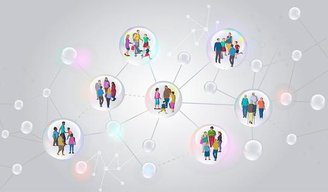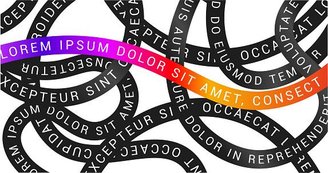
The social networks Instagram and Threads, both from Meta, gained a new feature in March 2024. The new feature is a “filter” that reduces the number of posts about politics recommended by the algorithm, especially from accounts you don’t follow.
The idea of the company, which also owns Facebook and WhatsApp, is to allow users receive less content about governments, elections and other social topics — unless they actively search for or follow profiles or publications of this type.
In a blog post released in February, big tech explained that the filter will not close all doors: it only works for content recommended in the feed, Reels and in the Explore tab, in the case of Instagram. If the user maintains contact with pages and accounts that talk about politics, they will eventually see posts on the subject.
In tests carried out by TecMundo, the new filter is now available on Instagram. According to Meta, it should arrive soon on Facebook. (Image: Carlos Palmeira/TecMundo)
“If you decide to follow accounts that post political content, we won’t prevent you from viewing these types of posts,” says Instagram’s statement.
Despite this, the news is in line with statements from Instagram’s CEO, Adam Mosseri: the executive even said that Threads “is not for news and politics” — despite the similar format to X, the old Twitter.
This move seems to please part of the community, which would be saturated or tired of seeing this type of content, especially in a space originally created for leisure and distractions.
The impact of the politics filter on Instagram
Political scientist Maria do Socorro Sousa Braga, from Federal University of São Carlos (UFSCar), argues that the user needs to have autonomy to look and interact or not with the content you want.
“The more access to good information, the better. If it is not fake news, the person can gain a greater level of awareness [vendo conteúdo político nas redes]”, highlights.
Despite highlighting the positive points of interacting with responsible content, the expert points out that big techs don’t seem so interested in promoting this type of thing. She herself maintains an Instagram profile and publishes lectures, debates and videos about politics, but she doesn’t see much return.
“The interaction [do público com as postagens] is quite small. So being on the networks does not necessarily mean that people are expanding the level of information”, he highlights.
 One of the consequences of content filters is the formation of bubbles on social networks. (Image: Getty Images)Fonte: GettyImages
One of the consequences of content filters is the formation of bubbles on social networks. (Image: Getty Images)Fonte: GettyImages
Uriã Fancelli, master in International Relations and author of the book “Populismo e Negacionismo”, also notes a positive and a negative side to the measure. The benefit is precisely to give more control, but the limitation can be risky.
“If the user exclusively follows people they already agree with, which is common, he may become more susceptible to radicalizations. This is because a lack of exposure to differing opinions can limit the ability to develop critical thinking,” he says.
Fancelli disagrees with the goal that political agendas be considered “sensitive”. Even if they eventually move towards discussions, he thinks it is important to maintain debates on topics related to the development of society.
Do social networks and politics mix?
According to the Digital News Report 2023 study, carried out by the Reuters Institute, a kind of “fatigue” in the consumption of political content is notable in news format, in addition to increase in distrust towards press vehicles and the content curation of algorithms.
I.e, politics is far from being a unanimous topic among those who access social networks frequently, despite the increasing presence of posts on the subject in recent years.
Infrastructure analyst Mauricio Rocha is one of the people willing to adopt Meta’s new development. He considers social networks as spaces for relaxation, consumption of interesting content and contact with friendsbut has increasingly come across publications of misinformation and hate speech.
“Having content about politics and interested people is very important, it shows that people are interested in changing and improving, and are more in tune with everything that is happening. But I see that there are many groups that end up doing the disservice of spreading much more misinformation than valid information, greatly damaging the political scenario and society itself”, he argues.
 Accumulated political content can tire part of the community. (Image: Getty Images)Fonte: GettyImages
Accumulated political content can tire part of the community. (Image: Getty Images)Fonte: GettyImages
At the same time, activating the filter does not mean turning a blind eye to the topic. “When I want to read about politics, I go to specialized news sites and pages that have verified content,” explains Rocha.
Nutritionist Letícia Rosa says she finds the political debate important and considers it harmful to exclude the “other side” from her worldviews. However, she makes a reservation regarding extremism.
“There is a side nowadays that is very radical. Today, these people don’t want to argue and are constantly disseminating fake news and misinformation on social media,” she argues.
 Some social media users are aware of the phenomenon of spreading misinformation. (Image: Getty Images)
Some social media users are aware of the phenomenon of spreading misinformation. (Image: Getty Images)
Because of this, the young woman mentions that she intends to activate the filter that disables political content suggestions from pages she does not follow. She points out that alsoDoes not see social media as the best environment to “politicize”.
“I prefer to look for information in reliable places. So when I want to know about something political, I usually read books, watch the news, go to websites and listen to specialized podcasts”, he concludes.
How to deal with politics on networks
Limiting the visibility of posts based on their topic (and not because they violate the platform’s rules, for example) is an easier solution than expanding moderation, for example. However, other paths could be considered to guarantee a less turbulent future on digital platforms.
“Politics is the topic of the moment, as the tension has grown a lot in recent years. And we will still see many debates and conversations about this in the future”, reinforces Maria do Socorro Sousa Braga. On the other hand, according to the researcher, the lack of contact with different opinions and content forms a “ghetto society” with very limited viewswhich can have very damaging consequences for future relationships.
 Following accounts on topics that interest you is an alternative to avoiding controversial topics. (Image: Disclosure/Meta)
Following accounts on topics that interest you is an alternative to avoiding controversial topics. (Image: Disclosure/Meta)
Fonte: GettyImages
Among the consequences, the political scientist cites the lack of a range of world views, creation of animosity between users, difficulty in interpersonal relationships, intolerance and, in the worst case scenario, an increase in the degree of violence on and off the internet.
And how can we prevent this scenario from developing? Going against the idea of the Meta, one of the possibilities is not to block the visibility of contentbut just get in touch with them to understand them.
“Pull up your chair and prepare for discomfort: Follow accounts that confront each of your cherished beliefs, adding a touch of acidity to your social bubble. Treat social media as an appetizer rather than the main coursedelving into more reliable sources, such as the traditional press, for a true informative meal”, concludes Uriã Fancelli.
Other side
O TecMundo contacted Meta to check more details about the decision to launch a filter that hides political and social content from accounts you don’t follow. However, the company did not want to take a position on the matter and commented that everything there is to share at the moment is in the blog post published in February that talks about the new classification.
In the official post, big tech states wanting “everyone to have good experiences on Instagram and Threads”. The giant points out that the filter only affects Public Accounts and that professional Accounts will be able to check whether they are being affected or not.
“We are always working to improve our recommendation systems and give people control so we can connect them with the posts that are most relevant to them. We will implement these changes slowly and gradually to ensure we are on the right track” , defends the company.
Source: https://www.tecmundo.com.br/internet/283104-instagram-limita-conteudos-politicos-bom-ruim-redes.htm


